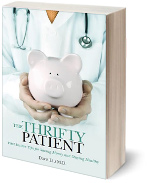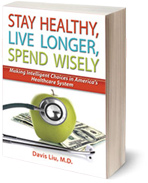ICYMI – In Case You Missed It – October 2015 – for Physicians and Physician Leaders
I think, at a child’s birth, if a mother could ask a fairy godmother to endow it with the most useful gift, that gift would be curiosity. – Eleanor Roosevelt
Health Care
- The next great challenge for doctors – Judgement calls. Clinching the RIGHT diagnosis. Critical
 if we are to make care more affordable. The Institute of Medicine (IOM), which released the 2000 report To Err is Human: Building a Safer Healthcare System, is out with Improving Diagnosis in Health Care. “…the occurrence of diagnostic errors — has been largely unappreciated in efforts to improve the quality and safety of health care.“ Doctors can get better only if we get feedback – “as of now we don’t have well-developed mechanisms for doctors to get feedback on the accuracy of their diagnoses, and information about the ones they get wrong.” To improve your diagnostic skills – listen mindfully to your patient!
if we are to make care more affordable. The Institute of Medicine (IOM), which released the 2000 report To Err is Human: Building a Safer Healthcare System, is out with Improving Diagnosis in Health Care. “…the occurrence of diagnostic errors — has been largely unappreciated in efforts to improve the quality and safety of health care.“ Doctors can get better only if we get feedback – “as of now we don’t have well-developed mechanisms for doctors to get feedback on the accuracy of their diagnoses, and information about the ones they get wrong.” To improve your diagnostic skills – listen mindfully to your patient! - Challenging the status quo is why UCSF Breast Cancer Surgeon Laura Esserman, Stanford ’83 MD, ’93 MBA inspires me. Profiled recently in the NY Times, she does not believe that ductal carcinoma in situ is cancer…“one of the most vocal proponents of the idea that breast cancer screening brings with it overdiagnosis and overtreatment. Her philosophy is controversial, to say the least. For decades, the specter of women dying for lack of intervention has made aggressive treatment a given….but last month, her approach was given a boost by a long-term study published in the journal JAMA Oncology. The analysis of 20 years of patient data made the case for a less aggressive approach to treating a condition known as ductal carcinoma in situ, or D.C.I.S., for which the current practice is nearly always surgery, and often radiation. The results suggest that the form of treatment may make no difference in outcomes. She pioneered same day multidisciplinary breast clinic at UCSF over a decade ago. In the summer of 2010, she united all of the five UC breast cancer clinics across the state to share and determine outcomes data. She notes that teamwork — “something I didn’t learn how to do until business school” and is the future of medicine and medical research.

- Telemedicine is Vital To Reforming Health Care Delivery says a recent Harvard Business Review article. Specifically three changes which have made care delivery unlike the past – increase of those with chronic disease (increase demand for services), more high deductibles and high copays (focus on less expensive options by patients) and algorithms. Is Dr. Joseph Kvedar of vice president of Connected Health at Partners HealthCare, right?
- Another inspiring physician leader is David Feinberg, MD, MBA, who also has a business degree, and now is the head of Geisinger. Feinberg previously led and positioned UCLA Health System to becoming a premier hospital system focused on exceptional service. As a result, he could command premium dollars from his insurers. His book Prescription for Excellence: Leadership Lessons for Creating a World Class Customer Experience from UCLA Health System
was co-authored by Joseph Michelli, who has profiled other service oriented companies like the Ritz Carlton and The Starbucks Experience: 5 Principles for Turning Ordinary Into Extraordinary
). Now Feinberg leads both the provider side (doctors and hospitals) and the insurer side, a very different role. He asks, “how do we provide great care for less money?” and his goal is “to close every one of our hospitals. Because we should take care of you at home. We should take care of you at school. Nobody wants to go to the hospital. We really need to work to keep people healthy. Now, people will still get hit by cars, and there’ll be complex surgeries that require hospitalizations. But I’m trying to put myself out of business.” Will he succeed?
Outside Health Care
- As the economy moves more to “gig” jobs (aka Uber, TaskRabbit, Care.com, etc), there will be fewer “traditional jobs” with benefits (think income, job, retirement security). Fewer companies will offer employer based health insurance. Is this a good thing? The National Domestic Workers Alliance (NDWA) has helped 5 states add standards like minimum wage, overtime pay to these gigs. The shift to gigs is inevitable. Change irreversible. Yet there is a very worrisome trend – It’s Getting Harder To Move Beyond A Minimum-Wage Job – During the strong labor market of the mid-1990s, only 1 in 5 minimum-wage workers was still earning minimum wage a year later. Today, that number is nearly 1 in 3.
- Alliances and partnerships abound outside healthcare. New fad or are they onto something? Chairman of Cisco, John Chambers, “no one technology vendor can handle all of its customers’ needs” as he partners with Apple, Apple with IBM, and Box CEO Aaron Levie notes in an interview with Mad Money – It’s not about competition but about collaboration.
- Good news! The public is turning away from drinking sugar! “The Decline of Big Soda – the drop in soda consumption represents the single largest change in the American diet in the last decade”.
- Organizations need continuous change to be successful. Even scrappy startup Southwest Airlines which bucked traditional airlines now has a strategy to operate like its rivals. The company is in the process of reworking or jettisoning altogether much of [founder Herb Kelleher’s] tried-and-true strategy—with plans to fly in a totally new strategic direction. In fact, after years of consistently outsmarting and outperforming the traditional carriers, Southwest is today remaking itself to operate more like them.
Personal
- Stress is harmful – that’s a myth. It’s how you approach it that matters. So says Professor Kelly McGonigal, a psychologist at Stanford. She spoke recently at the American Academy of Family Physicians about her new book The Upside of Stress: Why Stress Is Good for You, and How to Get Good at It
. I loved her previous book The Willpower Instinct: How Self-Control Works, Why It Matters, and What You Can Do to Get More of It
and share learnings from it to many of my patients during their annual physicals. I met Dr. McGonigal briefly at Stanford Healthcare Innovation Summit in 2013 – Recasting the Patient as Consumer.
- Call me a luddite – Why I’m never giving up my 1997 BMW! Complex Car Software Becomes Weak Spot Under the Hood. But that also means I can’t have a DIY oil change in 30 seconds. Wasn’t 20 minutes at Jiffy Lube fast enough?
- Which of the 20 cognitive biases are you most prone to?

What did I miss? What else would you add?

 Get important exclusive advice and tips on how to save money while staying healthy.
Get important exclusive advice and tips on how to save money while staying healthy. Learn how to make intelligent choices in America's Healthcare System.
Learn how to make intelligent choices in America's Healthcare System.